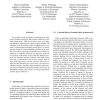417 search results - page 68 / 84 » The Dynamics of Reinforcement Learning in Cooperative Multia... |
ATAL
2010
Springer
13 years 8 months ago
2010
Springer
In open, dynamic multi-agent systems, agents may form short-term ad-hoc groups, such as coalitions, in order to meet their goals. Trust and reputation are crucial concepts in thes...
ICC
2007
IEEE
14 years 1 months ago
2007
IEEE
—This paper addresses context issues in pervasive mobile computing and presents a semantic context model to support location based cooperative mobile applications. In this paper,...
CDC
2010
IEEE
13 years 2 months ago
2010
IEEE
Abstract-- We consider reinforcement learning, and in particular, the Q-learning algorithm in large state and action spaces. In order to cope with the size of the spaces, a functio...
IAT
2005
IEEE
14 years 1 months ago
2005
IEEE
Our previous research presents a methodology of cooperative problem solving for BDI systems, based on a complete formal theory. This covers both a static part, defining individua...
ATAL
2007
Springer
14 years 1 months ago
2007
Springer
Tags or observable features shared by a group of similar agents are effectively used in real and artificial societies to signal intentions and can be used to infer unobservable ...

